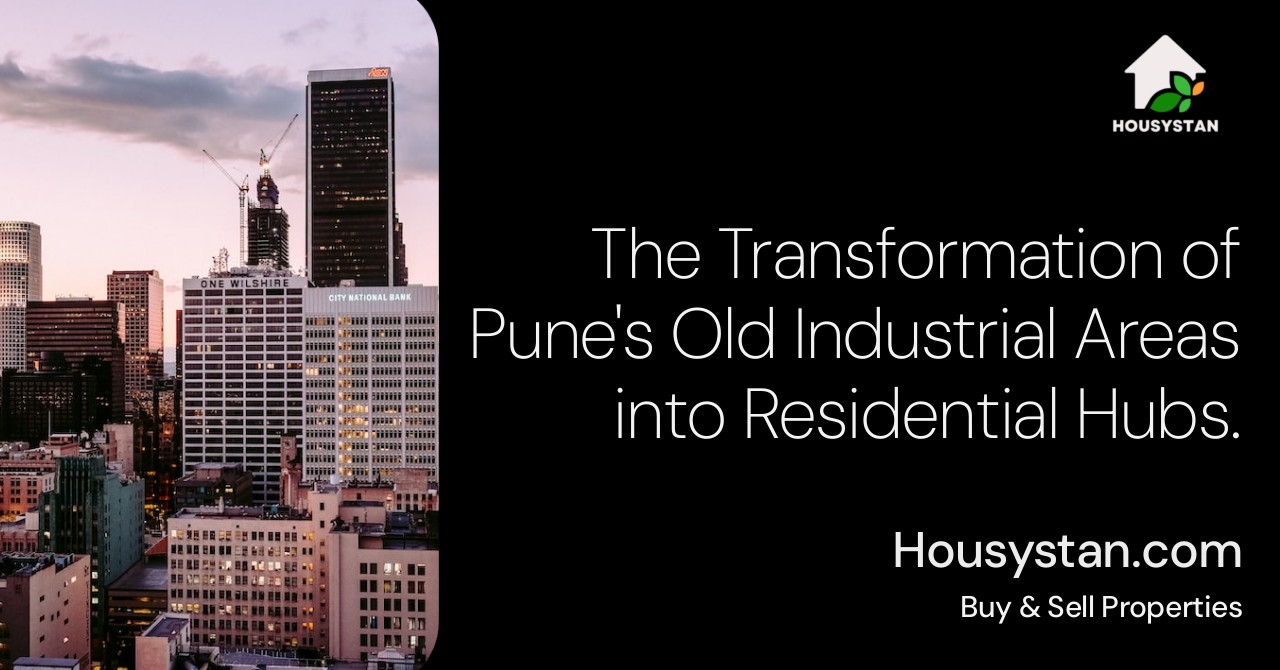The Transformation of Pune's Old Industrial Areas into Residential Hubs
Read latest blogs and articles from Housystan

The Information mentioned here was last updated on:
29/1/2026The Transformation of Pune's Old Industrial Areas into Residential Hubs
Pune, a city once renowned for its educational institutions and burgeoning IT sector, is witnessing a significant shift in its urban landscape. As the economic dynamics evolve, the demand for housing has spurred a transformation of Pune's old industrial areas into bustling residential hubs. This metamorphosis not only addresses the demand for housing but also reshapes the socio-economic fabric of the city.
The Legacy of Pune's Industrial Past
- Verified Tenants/Buyers
- Unlimited Property Listing
- Zero subscription/charges fee
Pune's industrial growth dates back to the mid-20th century when manufacturing and engineering establishments laid their roots. Areas like Pimpri-Chinchwad, Bhosari, and Hadapsar emerged as key industrial zones, housing factories and warehouses that manufactured everything from automobiles to machinery. These areas were strategically chosen for their proximity to transportation networks and the availability of vast tracts of land.
The industrial boom led to a diversified economy, drawing a workforce from across India. However, as global markets evolved and technology advanced, the traditional industrial model faced challenges. Environmental concerns, the shift towards a knowledge-based economy, and advancements in logistics sparked a re-evaluation of land use in these industrial corridors.
Economic Shifts and Their Impact
As Pune's IT and services sector gained prominence, the demand for real estate surged. The city witnessed an influx of professionals seeking employment opportunities, which in turn strained the existing housing infrastructure. With the core city areas reaching saturation, attention turned towards the expansive industrial zones on the outskirts.
The restructuring of these industrial areas into residential spaces became a practical solution. The land, once occupied by defunct factories and warehouses, was repurposed to accommodate residential complexes, offering a new lease on life to these areas. Developers capitalized on this opportunity by introducing modern housing projects equipped with amenities that cater to contemporary lifestyles.
The Demand for Residential Spaces
The shift from industrial to residential has been driven by an array of factors. With the growth of Pune's workforce, particularly in the IT and education sectors, came the urgent need for affordable yet well-connected housing. The transformation of industrial areas met this demand effectively, offering ample space for the development of high-rise apartments, gated communities, and townships.
Improved connectivity also played a critical role in this transformation. The expansion of public transportation networks, such as the Pune Metro, and the enhancement of road infrastructure facilitated seamless commuting from these refurbished zones to major work centers. This accessibility made these new residential enclaves highly attractive to homebuyers and investors alike.
Real Estate Development Strategies
Real estate developers have employed innovative strategies to attract potential homeowners to these former industrial areas. With a focus on sustainable living, many projects integrate eco-friendly designs, ample green spaces, and community-centric amenities. This approach not only enhances the quality of life but also boosts the appeal of these transformed areas.
Developers have been keen on creating self-sustaining communities. By incorporating schools, hospitals, shopping complexes, and recreational facilities within these localities, residents are guaranteed convenience and a sense of community. This all-encompassing approach effectively addresses the needs of diverse demographic groups, from young professionals to families.
Social and Cultural Transformation
The conversion of industrial zones into residential areas has sparked a cultural shift in Pune. As new residents arrive, they bring a mosaic of traditions and lifestyles, contributing to a vibrant cultural tapestry. Community events, local art installations, and cultural festivals have started to thrive, promoting a blend of old-world charm and modern aspirations.
Furthermore, this transformation has rejuvenated these once-underutilized areas, breathing life into local economies. Small businesses, from cafes to retail stores, have sprouted up, creating employment opportunities and enriching the community's overall vibrancy.
Challenges and Considerations
Despite the positive aspects of this transformation, several challenges persist. One of the major concerns is ensuring the infrastructural development keeps pace with the growing population. Adequate water supply, waste management systems, and energy resources are crucial for sustaining the new residential areas. Policymakers and developers must collaborate to address these urban planning challenges.
Environmental impact assessments are also necessary to balance development with ecological preservation. The risk of overburdening the city's resources must be mitigated through thoughtful planning and sustainable practices.
Government Policies and Support
The transition of Pune's industrial areas to residential hubs has been bolstered by supportive government policies. Initiatives like the Smart Cities Mission and various housing schemes have provided a framework for sustainable urban development. These measures aim to enhance the quality of urban living while ensuring economic and environmental sustainability.
Local governance bodies are facilitating this transformation by easing regulatory processes for developers and ensuring transparency in land-use policies. Their roles are pivotal in driving growth while safeguarding the rights and interests of residents and stakeholders.
Future Prospects
Pune's journey from an industrial stronghold to a residential haven is emblematic of larger global trends in urbanization. As cities evolve, adaptive re-use of land appears to be a sustainable solution to urban challenges. Pune stands as a model for other cities grappling with similar issues, demonstrating the potential for economic revitalization through effective urban planning and development.
As these new residential hubs continue to thrive, it is expected that Pune will emerge as a leading example of successful urban transformation, reflecting a harmonious blend of its rich industrial heritage and forward-looking residential expansion. The city is set to redefine its identity, inviting innovation and diversity while preserving its cultural essence.